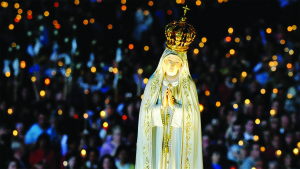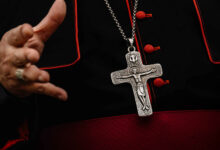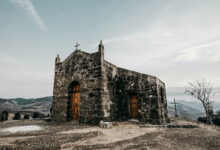Paths of faith
We dedicate this edition of the Milénio Stadium to the Catholic Church, to the steps that they are making towards its transformation and the phenomenon of Fátima. In an era led by a Pope who does not gather consensus, not even among his peers, we have decided to listen to opinions based not only on years and years of study, but also in faith—a concept that is hard to define and is often said to be unexplainable. The questions are the same, but the answers are different. We leave it in your hands to reflect and draw you own conclusion.

Stephen Bede Scharper, Ph.D., Department of Anthropology, University of Toronto
Milénio Stadium: Why does a human being feel the need to believe in God or any other supernatural force?
Stephen Bede Scharper: I think that this is because the mystery of the universe is so fast, awe-inspiring, and complex that the human is gobsmacked by the vastness and wonders of nature and the cosmos, aware that so many forces other than human forces are at work in the universe.
MS: How can it be justified that in some cases this belief is so strong that people are guided by rules dictated by their religious leaders?
SBS: Often people look for definitive and clear answers. Given the moral complexity of our times, and the tremendous social, ecological, and economic challenges of our times, people who are involved in their own personal struggles often look to specialists or certified leaders, “experts,” to provide guidance in areas outside their own. This sometimes leads to dependence upon, and unhealthy loyalty to, religious leaders.
MS: The papal decree recently announced contains “drastic measures” when it comes to violence and abuse of minors. This decree has also abolished the rule of pontifical secrecy on anything related to this matter. In your opinion, what practical outcome will Pope Francis positions have?
SBS: First of all, clericalism has been a major challenge in the Catholic Church for centuries. Part of clericalism involves a sense that the clergy are above or superior to the laity. This has entailed a culture of secrecy that suggested wrongdoing by the clergy should not be made public for fear that it might hurt the greater church. By beginning to break open this code of silence and secrecy, Francis might be opening up channels to eradicate the church of some of the baleful aspects of clericalism. How this will play out is not clear, but it signals an openness to changing a very toxic culture within the Catholic Church.
MS: It is well known that Pope Francis brought to the Vatican another way of performing his duties as the head of the Catholic Church. We also know Pope Francis has been facing some internal opposition, namely from the highest levels of the Roman Curia. Do you believe that Pope Francis will effectively change his Church? What balance do you make of his pontificate so far?
SBS: Yes, this is true, Pope Francis has faced a lot of opposition internally for his reforms. I think Francis has already made some very important changes in the church particularly in the area of ecology. His encyclical Laudato Si is a landmark document and will be the North Star for future Catholic ecological reflection. Moreover, if he has a chance to continue to appoint cardinals and bishops with a more inclusive mindset, this will help set the agenda for the next two to three decades of the Roman Catholic Church. I hope is that this direction will be more open, inclusive, humble, and falta aqui alguma coisa entre “sensitive”e o resto da frase certo?
MS: One of Francisco’s marks is a certain dispossession of material goods. How does this align with the ostentation and business that, for example, Fatima – the Portuguese sanctuary – display before thousands of pilgrims who visit it every year?
In adopting the name Francis, Frances is attempting to embody the simplicity, humility, and love of St. Francis. This is such a tremendous and important witness for the church. I do not, however, know enough about the Fatima sanctuary to comment on how it relates to Saint Francis’s teachings.
MS:As a Theologian, what does Fatima and the history of the apparitions that will have taken place there mean to you?
SBS: Again, I don’t have enough background in the Fatima apparitions to comment.
Roger Richard – Chaplain at Father John Redmond Catholic Secondary School which is in the Toronto Catholic District School Board.
MS: Why does a human being feel the need to believe in God or any other supernatural force?
Roger Richard: This is an interesting question because I have never felt that my faith was based on the answer to a need nor do I know any people of faith who have expressed that sentiment. I did not come to faith because of neediness. I was fine before I came to believe in God and in Jesus. It’s not that I was perfectly happy but I was fine. The more I thought about the idea of a creator and that creator loving his creation and visiting us in the form of Jesus, the more I was intrigued. God revealed himself to his people. I believe that Abraham, Moses, and the prophets were visited by God. Got entered into their lives. They didn’t dream him up out of need. They were fine in their lives but God challenged them to reveal his love to others, and live a greater life with him.
I’m not a Christian because I was desperate and needy and it made me feel better. I’m a Christian because I believe it’s the truth. The more I study and the more I understand the more I am convinced of its truth. And the more that I am in relationship with Jesus, the more joy and peace and meaning I feel in my life. But it’s not an easier life, it’s actually much more challenging, but it is much more meaningful as well.
MS: How can it be justified that in some cases this belief is so strong that people are guided by rules dictated by their religious leaders?
RR: I can’t speak for any other faith system but the leaders of the Catholic faith are given the mission of consistently teaching the faith and morals given to them from Jesus, who taught the apostles, who passed it on to the church throughout the centuries. So, it is not the present day church leaders who arbitrarily create rules for people to follow, they maintain the faith that was taught from the beginning.
Occasionally new issues have to be explored carefully by the church to discern what is the correct course of action. That’s when the Pope calls a synod. Cardinals, bishops, priests, nuns, lay women and men from around the world who have expertise in the concern gather to prayerfully discuss what the Lord God wills for His people. They have the benefit of the scriptures, the tradition of our faith passed on by Jesus and the apostles and the guidance of the Holy Spirit through prayer.
For example, a recent synod on the family is the source of the latest directions from the Vatican calling on transparency in cases dealing with the abuse of minors by clergy.
When faithful, intelligent, loving people from around the world gather together to discern God’s will, faithful Catholics can feel confident that their guidance is truly a gift of the Holy Spirit. I believe that the Catechism of the Catholic Church is a powerful gift for the world, and for my life. The more I follow the guidelines set out by the church, the more freedom, peace and joy I feel.
Morality is not a burden that keeps us from enjoying life, it is a means to find true freedom.
MS: The papal decree recently announced contains “drastic measures” when it comes to violence and abuse of minors. This decree has also abolished the rule of pontifical secrecy on anything related to this matter. In your opinion, what practical outcome will Pope Francis positions have?
RR: I believe that this course of action can only bring much good. For too long institutions in our society have neglected to protect those in their care. I understand that the abuse of minors is hard to deal with.
The latest statistics I have heard is that 11% of family members abuse others in their family. No one wants to face the fact that an uncle or an older sibling has abused a family member. In my experience with children I work with, families cover up these incidents and just wish them away. Hopefully, children will feel more and more empowered to report abuse and families will feel more and more ready to deal with perpetrators, even though they are family members. Perhaps the “Me Too” movement and the like will help in this regard. Although the percentage of clergy who abuse is much less, approximately 4%, it should be 0%. Our parish priest should be the first person we can look to for care, love and trust. How horrible when someone who is supposed to be the face of Christ ends up hurting children so deeply. Thank God that the church is moving toward complete transparency. Like anyone else in the society clergy perpetrators should be tried in civil courts and, if guilty, convicted and punished accordingly.
MS: It is well known that Pope Francis brought to the Vatican another way of performing his duties as the head of the Catholic Church. We also know Pope Francis has been facing some internal opposition, namely from the highest levels of the Roman Curia. Do you believe that Pope Francis will effectively change his Church? What balance do you make of his pontificate so far?
RR: As I have pointed out before, a Pope does have a degree of power as the vicar of Christ but the tradition of the church is maintained not by just one person but by the entire people of God. If change occurs it is through the groundswell of the people of God calling for reform. I believe that in our society at this juncture of history the chasm between the conservative right and the liberal left seems to be getting wider and wider. The disparity between the American Democrat and Republican values is a case in point. It is much the same in the church.
There are many who find powerful wisdom in the tradition of our faith who may fear any change and even feel the pendulum has swung too far to the left already. There are others who feel the church must respond more effectively to the trends of the age and be reformed. Although it is a work of fiction, and may not represent them accurately, the recent film “The Two Popes “ cleverly portrays this difficult balance between conservative and liberal narratives.
I feel that Pope Francis has navigated this delicate balance reasonably well. It is difficult for anyone who ministers in the church to deal with this tension. I’m faced with this every day in my vocation and I pray that the Holy Spirit will guide me and all others who minister in the church toward His holy will, in order to truly love and serve His people.
MS: One of Francisco’s marks is certain dispossession of material goods. How does this align with the ostentation and business that, for example, Fatima – the Portuguese sanctuary – display before thousands of pilgrims who visit it every year?
RR: Francis has been an excellent model of simplicity and the “preferential option for the poor” as John Paul II advocated for. He has worked hard to clean up the Vatican bank situation and has set a great example for all of us. There is no question that some have used the devotion of pious pilgrims to further their business careers. Obviously this needs to be discouraged at every turn. We tend to invest in things that we value greatly. When I see incredibly beautiful homes and fancy sports cars in Toronto it is clear that many value those items. Hopefully, people who are well-off will also remember those who are needy and share their wealth. Having beautiful things is not necessarily a problem as long as there is also a desire to serve the poor.
In the history of the church there has been a lot of investment in creating beautiful spaces for the worship of God. In more recent years worship spaces have become more simple and less ornate. This is well received by those who champion social justice.
I do see a place for creating beautiful things for God. When I have entered into cathedrals in Europe the awesome beauty inspires me and inspires a sense of the beauty and majesty of God. We also have to remember that the Vatican and all the beautiful cathedrals are not really owned by any person or group. They are owned by all God’s people over time. The pope or any other church leaders couldn’t sell the Vatican or anything in it even if they wanted to. It doesn’t belong to them. Again a difficult balance has to be found. The burning of the Notre Dame cathedral in Paris is an interesting example. Immediately millions of dollars came forward from businesses and other benefactors. The people wanted to restore its beauty and I believe they have a right to do that because, for them, it’s an expression of their love for God.
I have never been to Fatima but I have heard that it is quite beautiful and ornate. Those who invested in that venue were most likely deeply inspired by what they believed was the apparition of Mother Mary. Perhaps Some businesses there are taking advantage of people but it’s difficult to know someone else’s heart. Jesus said that we should not judge lest we be judged. Again, a difficult balance to maintain.
MS: As a Theologian, what does Fatima and the history of the apparitions that will have taken place there mean to you?
RR: I have always been a sceptical person and analyze things very deeply before I adopt an attitude toward them. I am very intrigued by the fact that Marian apparitions approved by the church are well documented and have ample supporting evidence for their veracity. When the Vatican approves an apparition the church is not saying that we must believe it happened. The church is only saying that believing it will not harm your faith.
I am definitely not an expert in Marian apparitions. I only have a basic knowledge of Fatima but what I have read about Mary‘s messages has been inspiring and has encouraged further study for me in eschatology. When I have more time I look forward to reading more about the history of Fatima. Right now my focus is more on Christology and the relationship of Christians with the Jewish people.
Thanks for your interesting questions and God bless!
MS: Why does a human being feel the need to believe in God or any other supernatural force?
Adrian Ciani: The need for human beings to feel the need to believe in God or any other supernatural force is a very ancient impulse, and indeed predates Christianity or any of the great monotheistic traditions of world history. It is perhaps that humans have long believed that supernatural forces exist in the world and influence and shape events. In time, this evolved into organized religions with structures, rituals, etc.
MS: How can it be justified that in some cases this belief is so strong that people are guided by rules dictated by their religious leaders?
AC: Over time, organized faiths developed rules, rituals, festivals and traditions that demarcated it from other faiths. As with any cultural tradition or practice, belief in a God and fidelity to a faith became attached to the faithful observation of the rituals and practices of that particular faith.
MS: The papal decree recently announced contains “drastic measures” when it comes to violence and abuse of minors. This decree has also abolished the rule of pontifical secrecy on anything related to this matter. In your opinion, what practical outcome will Pope Francis positions have?
AC: I do believe that the new measures to combat sexual abuse within the Roman Catholic Church introduced by Pope Francis in May 2019 mark a turning point in the Church’s attempts to grapple with the crisis that has now spanned the pontificates of Popes John Paul II, Benedict XVI, and Francis. Prior to the new law, a patchwork approach to investigations of abuse was applied, with discretion given to local bishops on how to proceed. This resulted in variances between countries, and sometimes between dioceses, on how to proceed with abuse allegations- a situation that produced predictable frustration, mistrust, and anger. The laws introduced by Francis have significantly streamlined the process of reporting abuse in several significant ways. While the laws do not require church officials to report abuse allegations to authorities (a fact which has garnered some critique), they do require that the Church will not obstruct the investigations of civil authorities. In addition, the laws stipulate that qualified laypeople can be called in to assist in investigations, that the privacy and confidentiality of accusers are protected, and those investigations are completed within strict timeframes. The laws also empower archbishops to investigate bishops under their authority. What is perhaps most significant about the new laws is the universality with which they are to be applied. Rather than to rely on the patchwork approach that had previously existed, Pope Francis has clearly signaled the importance of tackling the abuse crisis in a unified and universal manner.
MS: It is well known that Pope Francis brought to the Vatican another way of performing his duties as the head of the Catholic Church. We also know Pope Francis has been facing some internal opposition, namely from the highest levels of the Roman Curia. Do you believe that Pope Francis will effectively change his Church? What balance do you make of his pontificate so far?
AC: The Roman Catholic Church, despite its hierarchical structure, has never existed historically as a monolithic institution, and the impulses of tradition and reform have always shaped the life of the Church. In this sense, the pontificate of Pope Francis epitomizes the complementarity of these impulses. In calling for Catholics to return to a life of piety and faith, Francis has emphasized charity, justice for the poor, and a commitment to peace and inter-religious dialogue and fraternity. This does not mark a break with Catholic teaching, and in fact, is very much in continuity with the life of the Church since the Second Vatican Council in the 1960s. Francis’ social encyclical Laudato si, for example, urges Catholics to respect the global environment by reducing consumerism and supporting efforts to reduce global warming, was hailed by many as a turning point in the social teaching of the Church. Church teaching on respect for the environment, however, did not originate with Francis, though the encyclical did re-emphasize the Church’s global commitment to climate justice. In this sense, Pope Francis has brought renewed attention to the Church’s commitment to global peace and justice, though these teachings long predated his pontificate.
Madalena Balça/MS








Redes Sociais - Comentários